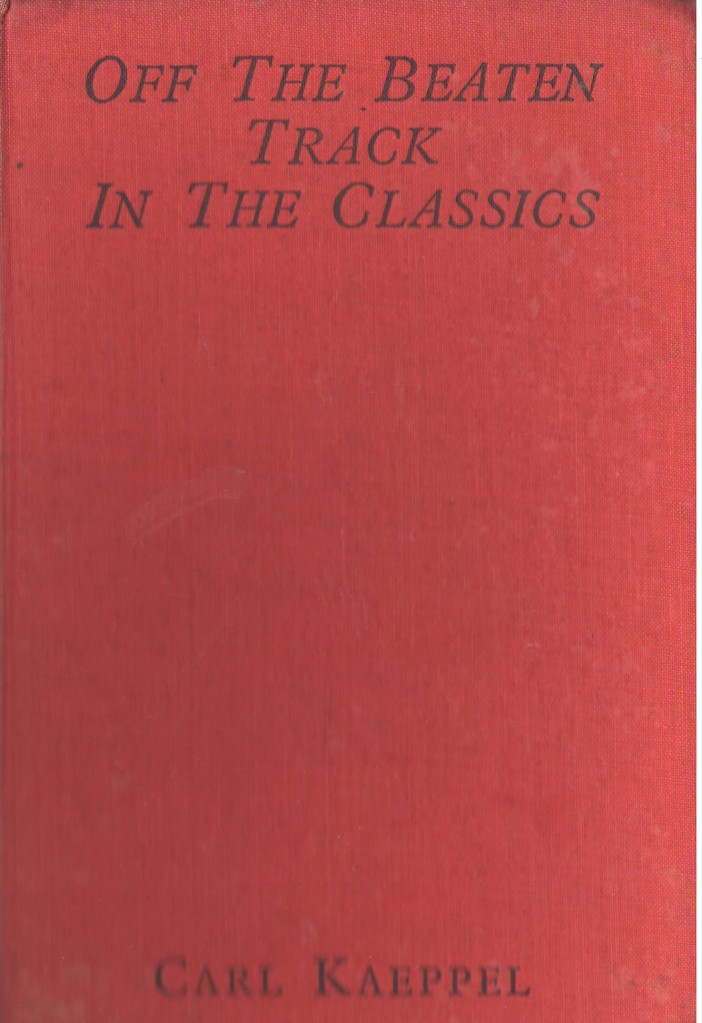Review: Off the Beaten Track in the Classics August 14, 2010
Author: Beach Combing | in : Ancient , trackback Beachcombing has to go and prepare a birthday surprise for a beloved niece and so decided that, today, he would limit himself to a quick write up of one of his favourite ancient history books: Carl Kaeppel’s Off the Beaten Track in the Classics (Melbourne 1936).
Beachcombing has to go and prepare a birthday surprise for a beloved niece and so decided that, today, he would limit himself to a quick write up of one of his favourite ancient history books: Carl Kaeppel’s Off the Beaten Track in the Classics (Melbourne 1936).
If the name does not excite you then the contents should. Kaeppel, an Australian scholar, covered the Roman ‘Fortean’ writer Solinus, ‘a teller of wonder-tales’; Carthaginian exploration into Africa (that Beachcombing has backed over in some previous posts); Greek exploration in India and along the Red Sea; the wilder side of antique mathematics with special reference to Aristarchus of Samos; Pytheas’s navigationes in the northern Atlantic; and ‘poison-damsels and the pseudo-Aristotle’.
Admittedly all of this is packed into a mere hundred and fifty pages. But Kaeppel is a fun if sometime snappish guide and the fact that the chapters originated as talks give them a natural fluidity that was already becoming rare in academic works in the 1930s.
Beachcombing has long been curious about this author and did some ‘research’ this afternoon.
Genius that Beachcombing is he had Kaeppel (obit 1946) down as a young waspish library-dwelling classicist en route to respectability and desiccation – ‘bald heads forgetful of their sins’ – but with still enough individuality to make his writing interesting:.
However – and this is a regular occurrence – Beachcombing was way off the mark.
After the Armistice [of WW1] Kaeppel studied archaeology in England, his researches in the British Museum laying the foundation for his profound knowledge of ancient geography. He returned to Australia in August 1919 and next year was appointed classics master at Melbourne Church of England Grammar School… A voracious reader with a photographic memory, Kaeppel excelled as scholar and teacher. Although he lacked an ear for phonetics (and could not pronounce an r), he had not only an intimate knowledge of Greek and Latin but ‘explored with indefatigable thoroughness’ the lesser-known ancient languages. A short man, in grey slacks and a well-worn sports jacket, he was a firm disciplinarian in the classroom; he carried an ash walking-stick which he banged on the ground to emphasize points and reputedly could inspire even the recalcitrant idler. His ‘lads’ greatly respected him. He lived in the school lodge, made generous, impulsive gifts to his friends from his extensive library, and was an habitué of the Savage and Naval and Military clubs. He was a spell-binding conversationalist. However, his heavy drinking increased with the years and in 1931[Off the Beaten Track was published five years later] he was forced to leave Melbourne Grammar. He moved to Sydney where he lived by coaching and by freelance journalism. [ADB]
This fair wiped the smile off Beachcombing’s face. Get rid of a world war, change continents and read ‘sugary caffeine drinks’ instead of alcohol and this is virtually the present writer’s biography – minus, sadly, the brilliant book at the end of it.
Beachcombing hopes that at least Catullus walked Kaeppel’s way.
Beachcombing would love to read Kaeppel’s only other work: Short History of Latin Literature that is quite rare on this side of the world even in copyright libraries – a few second hand shops in Austrialia sell it. Meanwhile, those interested in Off the Beaten Track should be able to pick it up for about twenty dollars from the States.
Beachcombing notes that it is now out of copyright and would make a lovely reissue for an energetic, short-run publishing house. Beachcombing would even offer his moudly copy for scanning: but little Miss B recently decorated its innards with a blue felt tip pen.
Beachcombing would love to put a picture up of Kaeppel. Can anyone help? Drbeachcombing AT yahoo DOT com


